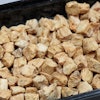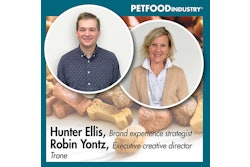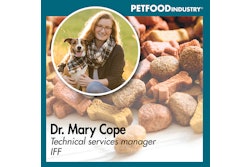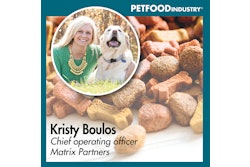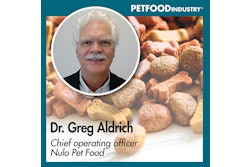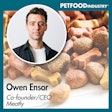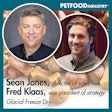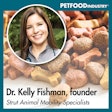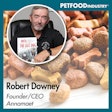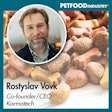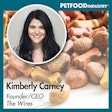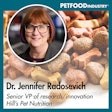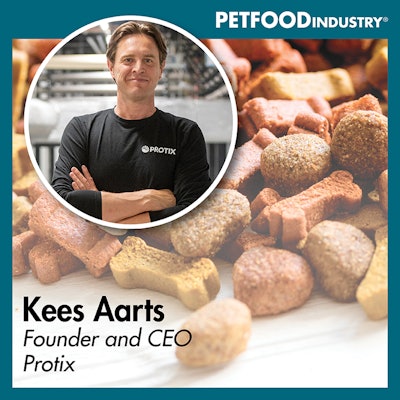
In this episode of the Trending: Pet Food podcast, host Lindsay Beaton and founder and CEO of Protix, Kees Aarts, have an in-depth conversation about entrepreneurship, business, insect protein and the pet industry.
The below transcript is from Episode 70 of the Trending: Pet Food podcast. Host Lindsay Beaton talks with Kees Aarts, founder and CEO of Protix, about the challenges of entering the pet market with a novel ingredient, noting the importance of perseverance, adaptability and collaboration over competition. You can find the episode at Trending: Pet Food, on SoundCloud or on your favorite podcast platform. This episode originally aired on September 11, 2024.
We want to thank AFB International for sponsoring this podcast. AFB is the premier supplier of palatants to pet food companies worldwide, offering off-the-shelf and custom solutions and services that make pet food, treats and supplements taste great.
Lindsay Beaton – editor, Petfood Industry magazine, and host, Trending: Pet Food podcast: Hello, and welcome to Trending: Pet Food, the industry podcast where we cover all the latest hot topics and trends in pet food. I’m your host and editor of Petfood Industry magazine Lindsay Beaton, and I’m here today with Kees Aarts, founder and CEO of Protix. Hi Kees, and welcome!
Kees Aarts, founder and CEO, Protix: Hello, Lindsay. Very happy to be here, looking forward to this interview.
Beaton: In case you’re unfamiliar with Kees or Protix, here’s what you need to know.
Kees is a visionary leader, renowned for spearheading groundbreaking innovations and driving remarkable company growth. His unwavering commitment to making a meaningful impact motivates him to create innovative solutions that tackle global challenges. Kees is a frequent speaker at international forums, and he is widely recognized as an innovator and thought leader in the food and feed industry, particularly for his work in reimagining global food supply chains. Before founding Protix, Kees began his career as an advisor at McKinsey on R&D innovation and business development. Kees holds a masters of science in aerospace engineering.
Protix is the leading company in insect-based ingredients for healthy and sustainable pet food, aquaculture, livestock feed and organic fertilizer. The company is on a mission to create low footprint ingredients that solve major issues in the current food system.
Kees’ extensive experience in business, particularly in innovation and company growth, and his breaking into the pet food market with a novel ingredient, are why I’ve brought him on today to answer this question: How do you successfully launch a startup into an industry as saturated as the pet market?
So, Kees, I always like to get people's origin stories and find out how they ended up here in the pet world and where they currently are in their careers. What made you gravitate toward insect protein? And then, how did you get Protix off the ground?
Aarts: I like that you end the question with the word ground. While you were asking the question, the word grounded came to mind. The more I reflect on my own origin story with Protix and why did I spend my time and capabilities on this, I must go back about 15 years ago. I was always committed to nature and sustainability, which has to do with the way my grandmother and my parents were grounded as people.
I grew up in a family where my grandmother lived in our house with my parents, which is a bit unusual in the Netherlands. My grandmother was a feed miller's wife and a mother of eight children. When her husband passed away – he was the manager of the family and the company and the farm – and they lost quite a bit after the war, but they always stay grounded in the way they consume. They think about nature. They think about life.
When I did my studies aerospace engineering, focused on physics and material science, it was crystal clear that whatever we consume and however you want to describe yourself as a consumer, whether you're a maximalist or a minimalist or whatever, you're still a consumer. You consume something, you have a footprint somewhere.
It struck me that we need to have these massive changes at the beginning of the value chains. It doesn't matter whether you move from A to B, a car or bike or a plane, it's the energy mix and the storage thereof and the transformation from that energy in your mobility that matters. If nobody works on the transformation of the energy mix, it doesn't matter what you want from mobility. It won't become sustainable.
Nobody changes the protein mix at the beginning of the mix. It doesn't matter what we say, whether we're flexitarian or not, it still will make a lot of difference. Knowing quite a bit from farm life, and triggered by a passion for nature, the question came about, why aren't we using insects as a source the way nature does?
Insects are the cleanup crew of nature. They are the source of nutrition for almost all animals. When they're young, when they need to grow fast and need to build an immune system, which we'll address later as well. Why are we not maximizing the utilization of insects in our global food system?
I'm not the sort that tells people what to eat. I do believe that choice is part of food, because it's cultural, personal, historical. But wherever it comes from, from land or water, however you mix it, whatever you feed it, the starting mix must become sustainable in terms of CO2, land and water use. It should stop being depleting, extracting and polluting. These are the ways we destroy the world around us. We need to change the beginning.
In nature, insects are part of that beginning. It’s the grounded environment in which I grew up. Insects just make sense from a value chain perspective, natural perspective. In my view, it's almost like a first principle, or grounded principle, that makes sense. That’s why I started 15 years ago.
Beaton: What were your initial intentions when you started Protix? What industries were you hoping to be into? Were there any challenges? Insect protein is common in many cultures in the world, but less common in other places. There must have been a lot of factors you had to overcome to get this off the ground and make it successful. What was your initial thought process like?
Aarts: I don't know how many possible entrepreneurs are listening, but you don’t really think about it that much consciously. I mean it. I'm consciously naive about a lot of things, because if you truly think about it, you don't do it. When we started, there were at least five regulatory barriers that just didn't allow us to do it. Normally, only one is enough for people to not invest and not do it.
Let's take an analogy in the electrical mobility from 2014 to 2019. For almost five years, the whole world was saying Tesla would not make it. It didn't make any sense that a company would think they would be better than Volkswagen and Toyota.
When you ask me, “What were your plans? What was your intent?” I literally don't know. I just know that it made sense. It's going to be a hell of a struggle. It's going to be a hell of a road. It's going to be immensely difficult to get it all done.
Create a legislative roadmap, create a technology framework, create a biological understanding, create the adoption of marketing appetites, create the interest of the customers, create the appetite of investors to invest in a lot of money. All of that made no sense to start doing it.
But that's not why people start a company. There are entrepreneurs that start a business. I can find at least 10 business opportunities within a day. There's always, always somewhere an opportunity to make some business. If you want to start a company and create a new industry, it's different, right? Then you should not think too much.
Beaton: Once you started on the path, was there anything that really surprised you?
Aarts: I don't get surprised easily, and I don't regret. I genuinely believe that people can do extremely creative, cool stuff, so I'm often surprised that people think they can't. If you look at what people create at Protix, it's amazing. I'm inspired by many results and how they pulled it off every single time, and keep innovating and make failures and keep innovating, make failures and so on.
I'm disappointed sometimes. That's also a form of surprise. I'm disappointed in how outsiders think they can tell you what and what not to do, particularly from the investment community. That's the most difficult part. You always need to make sure that you find the right ones that align their capital potential with your business acumen and interest. We succeeded there quite well.
Maybe I'm surprised about the lack of mutual motivation. So you're creating an industry – every time a competitor launches something cool, I celebrate it. That is not natural for entrepreneurs to do apparently. I see a lot of entrepreneurs immediately saying why that is worse than their own proposition. But it doesn't work the way, because the customer eventually wants to see an array of cool propositions, right? They don't want to see a disarray of competitors telling why the other is not functional.
I'm a little bit surprised about the uncollectiveness of these sectors. In the last four or five years, I see a general movement to what I call in the three Cs, to commercialize better, compete harder, and collaborate smarter. Those three I do see improving over the last, let's say five to six years.
Beaton: I want to talk more about what you said regarding competition versus collaboration. Globally, I feel we're entering an era of fatigue when it comes to listening to companies talk about how this other company is worse than them, rather than just existing off their own merits. Don’t tell me why this other person sucks. Tell me why you are amazing.
You said that does not come naturally to people. In an industry like insect protein, which already has a lot of external barriers to it, there's a lot of education that needs to be done for the consumer. There's a lot of regulatory stuff that is up in the air all over the world, depending on what the thought process is on insect protein and how developed it is already, and how it exists in the consciousness of the culture that it's being regulated in.
What is it like to try to build something in an industry that's up and coming? What do you think are the best ways to go about doing that? You talked about how you celebrate when other people enter the industry and succeed. What's behind that mindset?
Aarts: These are very personal views. In my view, what's behind that? I think the two layers. One is the current zeitgeist and trends. The polarization and the way people tell each other what to do is creating a fatigue. On the one hand, it's supposed to be rooted in freedom of speech, and it feels like it's rooted in general freedom to dress yourself, right? There’s a big problem. The other layer is more on the technical side. The first one is very emotional, where I feel people just don't get it. Let's take competition.
Competition is in many ways, and for many people, about survival versus killing. It’s a zero-sum game. I win, you lose. I want to avoid you catching up or you having something I don't have.
I believe that competition is a positive game. It’s about trying to win even if you lost before. You do something admirable. I try to be better. You do something great. It makes me driven to do more. Competition is about creating propositions for the customers, where eventually, through the competition and all the different competitors, the entire field improves across the board and the consumers have better.
I'm telling a story built out of prosperity coming from competition. A lot of people take competition as, “I don't want you to win. I don't want you to have something I don't have.” Let's park that one, because that's personality. It’s the same as being envious and jealous. It doesn't have to be something negative, but often the person is hurt themselves.
Let’s say a lot of companies and leaders take the negative side of competition. I think the ones who take the positive side of competition generally don't trigger fatigue. If I listen to an entrepreneur or a person that is trying to sell the company in a positive way, trying to position them better versus the umfeld (surrounding field) and the competitors without bashing anyone, it’s still a very nice story, right? You still feel like you want to be led by this leader.
Back to the trend. The new generation is far more conscious about the backdrop and what it takes to balance anything you want to say, sell and do. You don't get away with a promotional story by kicking someone else down. The new generation is far more willing also to make tradeoffs, to bite the bullet and make their own commitments and consequences to create a better world.
If you want to run a company or build a brand, you must be very careful about linking yourself to anyone else. Being part of a brand or ecosystem by saying you're the only one, therefore you're the best, also doesn't work, because that's isolationist. I think bashing others doesn’t work anymore.
Beaton: As an entrepreneur with that mindset, how do you go about gathering the right people around you when you're building a company? When you're looking for investors, how do you find like-minded people to connect with so that you can succeed and make sure that your ethos is strong throughout your entire company?
Aarts: If people hear me and other leaders in our company talk this way, you will know quite quickly whether you fit in or not. There are standard stories for hiring and there are stories you tell which people feel is immediately unique.
The beauty about being unique is unique is infinite. Being the same is finite. Per definition, not everything is the same, so try to be like the rest.
If Shell gets 700,000 people applying for a job, they must be doing something good. If you try to copy that, you won't get 700,000 applicants. Doing the same is not the way to be unique. We try to weave in all those elements in recruitment and onboarding and presenting our people, presenting our company, and that's an attractive to a lot of these people.
Beaton: I want to talk about breaking into the pet industry with an idea like insect protein. In Europe, it's further ahead than where I am in North America, but there's still a lot going on and a lot of growth for insect as a protein in pet. What made you set your sights on pet? What has it been like introducing a novel protein at this stage of the game into an industry that is looking for novel proteins and more sustainable proteins, but there's also the conflict of it being an insect protein. What has all of that been like? Why did you set your sights on pet to begin with?
Aarts: When you come to the market with new products, it’s always, always expensive, whatever it is. You scavenge the markets. Great opportunities. We believe in feeding animals. We believe in creating a sustainable food system. Our human food is connected to the animal feed and pet food, whether we like it or not. If we would all stop having pets, our food will become more expensive, because a lot of the valorization of the food system is in the pet food industry. It is all connected. That's number one.
Two, pets are great animals in the sense they also need quality feeds to have good fur, good microbiomes in the guts, healthy breath, healthy gut. We also like whatever comes out at the back to be relatively firm, structured, which is a result of a healthy gut as well. All that means it's a great market. It allows for nice marketing and introductions. Health promoting benefits also are valorized. It was a very logical starting market.
Then, as always, you need ambassadors. Our first buyers are the ones who created our first growth, and we've been loyal to them ever since. We make sure they always get the first Intel they can first product. We always try to deliver them first.
Through that enthusiasm, their ambassadorship became bigger, their efforts in trying applications, failing, trying, failing, trying, failing. Then the number of SKUs increased. We've got hundreds and hundreds of different products in the markets, in thousands and thousands of outlets, stores, in stores, online, you name it. From that traction, we learn more. Now we have cat studies where everything we believed in -- young animals need to grow fast, build the immune system -- there must be something good in insects, right? Boom. Modulating the gut bio, short-chain fatty acids -- all help for the right bacteria growth to reduce inflammation, to support the immune system, and that's in picky and choosy animals, right? That's in cats. From ambassadors that help us grow to learning more about the health promoter benefits to doing studies with partners, this has become a very, very solid growth market.
Beaton: You've been doing business for a long time, and you've been in other industries. What have you learned specifically about entering the pet market? Any new lessons or any growth as a businessperson that you've experienced since you jumped into the market?
Aarts: Some of the entrepreneurs that I've met in the pet food industry are what I call the “real entrepreneurs.” Real entrepreneurs are, for me, the companies that have a family character, investing in local communities where their factories are, where their warehouses and production lines are.
Pet food manufacturers, companies tend to think, “How does it enrich the family life?”
It’s about parents, but in general, it's about people feeds an extension of the family, and they internalize it in a way they run the companies. I genuinely like to walk in a pet food company, even though it's financializing stronger, with a lot of private equity as well, because, of course, it's also high growth, high profitable industry. Still, I think a lot of entrepreneurs in pet food and a lot of business owners, the way they think about investments, creating proposition, serving their clients and customers, I learn a lot from.
Beaton: What is your favorite part about what you're doing right now?
Aarts: I am extremely lucky. You know why? Because I'm in a role where I'm allowed to redefine myself and a lot around me. Of course, I'm not totally free. I also have responsibilities towards shareholders, team, management and customers, so total freedom doesn't exist. I am relatively free versus a lot of people in the world to create new pathways to direct into something you believe in.
The downside of that is, you're a problem extractor. On the one hand, you need to support everyone in the company for whatever they do and back them. In return, it means all the issues that eventually are unsolvable are put on my table. The downside is the big problems are extracted. The upside is you could create a lot of direction and opportunity out of chaos and complexities.
I think the beauty of a founder CEO is you get the chance to create out of chaos and complexity. That's something I genuinely love, and I would love to keep doing that the rest of my life.
Beaton: The pet food industry has a lot of entrepreneurial spirit injected into it right now. It's a very safe market to get into. It's a very popular market to get into. A lot of investors are looking at it. There's always a new ingredient company or a pet food brand popping up. What are some of the startup rules or advice you wish someone would have given you when you set out, when you first started on the path to being an entrepreneur and doing the startup thing?
Aarts: My elderly self would advise my younger self -- it wouldn't be too much on how you're going to plow your way through the minefields, right? Whoever steps in the pet food industry, or any industry, has a vision and imagination telling what is and isn't smart from a commercial or product or innovation perspective. Those concerns I typically just wave away. It's about the execution anyway. Let people just run with their ideas. I would never advise anyone on the level of commercial, operational. They can ask me stuff. I will try to challenge them. I will try to give them experiences and contemplations, but it's theirs to decide and run with it.
The most I would advise would be on the physical rulebook of running a business. The company eventually is nothing more than a piece of paper that creates the rules and the conditions for people to act within. There's a statutory document somewhere that says this company is allowed to take all kinds of financial risk, blah, blah, blah, if they allocate that to black soldier, fly production in the food system, blah, blah, blah. I couldn't go out tomorrow and suddenly take risk in producing cars or buying Bitcoin. That's logical.
A company is a certain framed environment in which people create and act on that framed environment. I would tell some companies where to hold their cash and where to invest their cash, simply to keep the entrepreneur and the company as free as possible to make mistakes and persevere.
A lot of companies, quite quickly, are so limited in terms of their freedom to operate, freedom to create and a freedom to fail, that even though their idea is good, even though their leader is good, it just won't work. Often, the investor or the world around it, says, “It was a great product, but the timing wasn't right. No. Very often it's the combination of the leader, yes, the combination of the people and the product, yes, but also the combination of -- is the structure in which they act supportive? Yes or no? When I find and look at it, I often see very badly structured companies. I'm also available for young entrepreneurs, when they approach me, I'm always available for support.
Beaton: Before we wrap up, I want to get your thoughts on what you see opportunity wise for insects in the pet space. What do you think the future looks like when it comes to an alternative protein like insects in pet food?
Aarts: It's a fundamentally clean, healthy, low-footprint and sustainable ingredient. It will become a structural part across all kinds of products.
Beaton: How long do you think it'll take?
Aart: We're doing thousands of tons already a year. That will be tens of thousands of tons. Hundreds of thousands will take another couple of years.
Beaton: Wow, that's not that long.
Aart: No.
Beaton: It sounds like there's a lot of opportunity out there yet to be had in a growing segment of the industry.
Aart: Absolutely. Jump in. Let's face it, we're in the downslope of the Gartner Hype curve, right? It is. There's a lot of companies struggling, but that needs to happen. We need to start looking at standardization of production. We need to create a certain performance plateau with certain applications. Then a bunch will survive, and they will create a massive growth momentum. Then, suddenly, it's a predictable, reliable ingredient with known health-promoting benefits and a diverse set of customers with genuinely positive applications. The next few years, there will be some challenges, but after that, progressive growth.
Beaton: Well, thank you so much for being on, Kees. This has been an amazing conversation about entrepreneurship, business, insect protein, the pet industry. We covered a lot of ground in not a lot of time. Thank you so much for being on and providing all your insights.
Aarts: Thank you, Lindsay.
Beaton: Before we go, I always like to do a little plug for my guests. Where can people find more information about you and Protix?
Aarts: Protix can be found through the website, protix.com, and on LinkedIn and the socials. From there, you also find me on LinkedIn and follow me there.
Beaton: Perfect. That's it for this episode of Trending: Pet Food. You can find us on petfoodindustry.com, SoundCloud or your favorite podcast platform. You can also follow us on Instagram @trendingpetfoodpodcast. And if you want to chat or have any feedback, I'd love to hear from you. Feel free to drop me an email: [email protected].
And of course, thanks again to our sponsor AFB International, the premier supplier of palatants to pet food companies worldwide, offering off-the-shelf and custom solutions and services that make pet food treats and supplements taste great.
Once again, I'm Lindsay Beaton, your host and editor of Petfood Industry magazine, and we'll talk to you next time. Thanks for tuning in!


